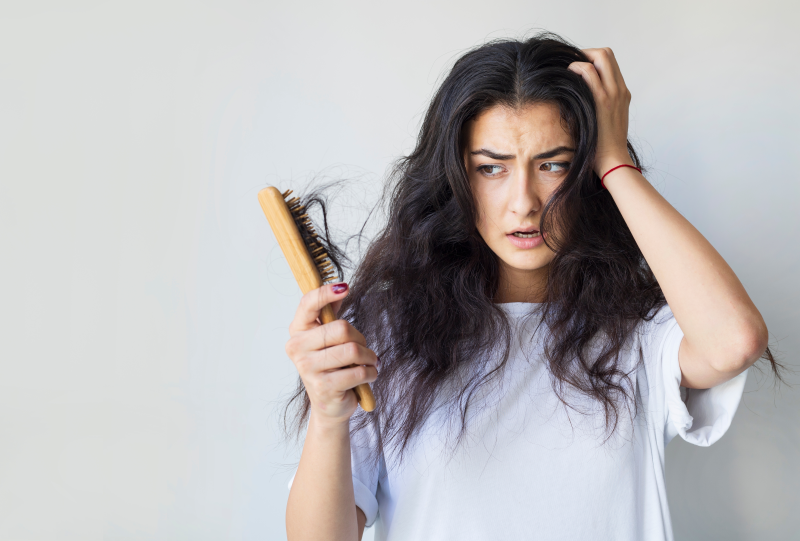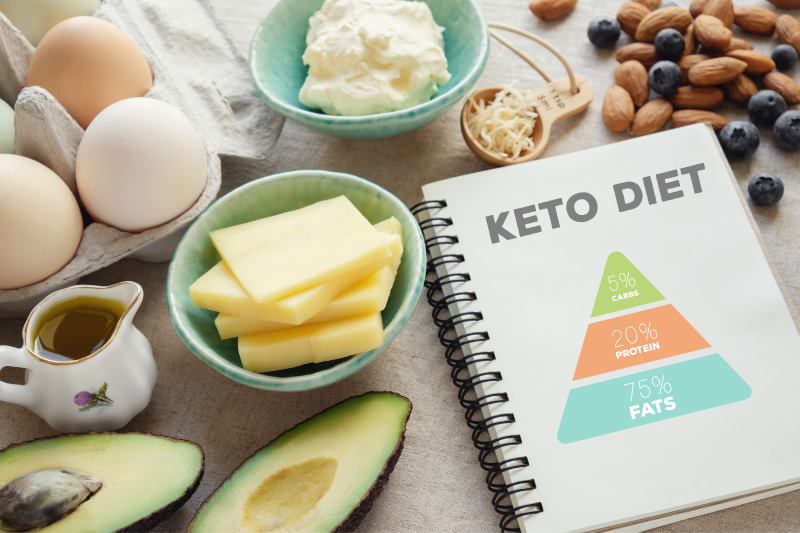Unraveling the mystery of hair thinning uncovers a tangled web of causes, ranging from hormonal fluctuations to nutritional impacts. It’s not just about what’s happening in your head but also what’s happening inside your body.
Embarking on this exploration of hair diminishment, we’ll delve into the roles thyroid malfunctions and elevated estrogen quantities contribute to the scenario.
But that’s only scratching the surface. Your plate matters, too–sugar spikes and soy proteins could be culprits in disguise.
Stress isn’t just an emotional burden; it physically manifests by disrupting hormone levels, leading to noticeable hair changes. And if you thought all was lost when genetics or autoimmune conditions entered the fray.
We’re diving deep into lifestyle shifts and nutritional tweaks that can turn the tide against alopecia.
Ready for a transformative look at tackling hair loss? Let’s get started.
Understanding the Roots of Hair Loss
Hair loss can feel like a mystery wrapped in an enigma, but when you break it down, hormones and diet often play leading roles. This doesn’t just affect your scalp; it’s about what’s happening inside your body.
Thyroid Problems and Hair Thinning
If your hair gets thinner by the day, your thyroid might throw a wrench into things. Thyroid issues can make your hair brittle and weak–think of it as if it is on a hunger strike because it’s not getting the nutrients it needs from blood flow affected by poor thyroid function.
Improving liver health boosts bile production, which helps normalize thyroid functions, offering hope for those locks.
Exploring dietary adjustments to enhance liver wellness presents an alternative avenue for bolstering the management of thyroid-related complications.
The Impact of High Estrogen Levels
You might not think about estrogen playing hardball with your hairline, but high levels of this hormone can sideline healthy hair growth. Sources such as certain plastics or soy products could inadvertently hike up estrogen levels more than we’d want.
These elevated levels may block efficient thyroid functioning, causing thinning strands that lack life and volume.
A proper diet that avoids these triggers may help maintain an average estrogen balance, keeping our endocrine system and hairstyles happier.

The Role of Diet in Hair Health
The quality of our hair often reflects the nutrients we consume. A proper diet rich in vitamins, minerals, and proteins is essential for maintaining healthy hair.
By incorporating foods that promote hair health, such as those rich in omega-3 fatty acids, biotin, and vitamin E, we can support stronger, shinier hair from within.
Sugar Consumption and Insulin Resistance
Gorging on sweets doesn’t only expand your midsection; it can lead to a literal tug-of-war with your locks. When you overload on sugary treats, your body becomes insulin resistant.
This messes with your hormones by converting estrogen into androgens, which are not the best friends of a full head of hair.
This hormonal shift doesn’t just stop at craving more sweets; it kicks off a cycle that can lead to thinning locks or even bald patches. Reducing sugar could help keep your insulin levels and hair follicles happy.
For those who’ve seen their vibrant strands lose their luster over time, revisiting dietary choices might provide some answers–and solutions. Consider this: reducing sugar intake is good for overall health and might bring back that healthy sheen to your mane.
Soy Protein Isolates and IGF Levels
Diet foods often tout soy protein isolates as a healthy alternative to meat proteins, but here’s the catch: they may contribute to hair loss by spiking IGF levels in the body.
High IGF levels have been linked directly to various forms of alopecia due to their effect on the lifecycle of hair follicles.
Making smarter food choices involves reading labels closely and possibly steering clear from products heavy on soy protein isolates if maintaining lush locks is at the top of your priority list.
Stress-Related Hair Loss Mechanisms
Stress can impact hair health in various ways, including through its effects on hormone levels and nutrient absorption. High-stress levels can disrupt the normal hair growth cycle, increasing shedding and hair loss.
Understanding the mechanisms behind stress-related hair loss is crucial for developing effective strategies to manage and prevent it.
Adrenal Overload from Sustained Stress
Imagine your body as a finely tuned machine, with stress throwing a wrench into the works. Chronic stress doesn’t just make you feel frazzled; it sends your adrenal glands into overdrive.
This constant state of alert pumps up androgen levels, hormones that can lead to hair thinning when out of balance.
This hormonal havoc is more than just an internal issue. It manifests visibly with receding hairlines, unexpected facial hair growth in women, and even acne outbreaks that seem to come from nowhere. It’s like your body’s distress signal flaring up for everyone to see.
Exploring articles on how stress affects the body can be incredibly enlightening to get deeper insights into how prolonged stress impacts our bodies and, specifically, our hair health.
Diving into these materials, we grasp the intricate link between ongoing stress and diverse bodily ailments and receive advice on mitigating these impacts before they intensify.
Autoimmune Factors in Hair Loss
Hair loss can also be influenced by autoimmune factors, where the immune system mistakenly attacks hair follicles. Conditions like alopecia areata are characterized by this autoimmune response, leading to patchy hair loss.
Understanding the role of autoimmune factors in hair loss is essential for developing targeted treatments to address these conditions.
Alopecia Triggered by Adrenal Gland Activity
That’s what happens with alopecia–an autoimmune condition where the immune system mistakenly attacks hair follicles. This can lead to noticeable patches of hair loss.
Stress is a critical player in this mix-up, which cranks up activity in the adrenal glands. When stressed, these glands go into overdrive and produce excess hormones that can trigger an autoimmune response against your hair follicles.
It’s like having a hyper-alert security system that accidentally targets friendly forces. To understand more about how stress impacts your body and potentially leads to conditions like alopecia, this detailed study on stress and the human body offers some fascinating insights.
Tending to your stress levels isn’t only beneficial for maintaining a serene state of mind; it might also play an essential role in ensuring your hair remains thick and flourishing.
Comprehensive Strategies for Managing Hair Loss
Comprehensive strategies for managing hair loss encompass a multifaceted approach that addresses underlying causes and promotes scalp health. These strategies include dietary modifications, stress management techniques, and targeted hair care routines.
By adopting a holistic approach, individuals can optimize their chances of addressing hair loss effectively and promoting hair regrowth.
Targeting Thyroid Health for Better Hair
Better liver health can be a game-changer for your thyroid and, by extension, your hair. Think of the liver as the gatekeeper that helps convert thyroid hormones into forms your body can use more effectively.
This process is crucial because when these hormones are out of whack, one of the first places you might notice trouble is on top of your head.
A good starting point to support this delicate balance involves focusing on foods that boost bile production–like beets and leafy greens–and considering supplements like choline, which have been shown to support liver function.
It’s all about giving your body what it needs to keep things running smoothly.

Balancing Hormones Through Diet and Lifestyle
If high insulin levels were a party, consider refined carbs and sugar its most enthusiastic guests. What’s the issue with this wild bunch, you might wonder?
They kickstart a domino effect in our bodies, leading to hormonal imbalances, which often manifest as hair loss, among other issues. Toning down on these offenders and adopting relaxation practices like yoga or mindfulness might aid in rebalancing our system.
Equally important is avoiding foods known to spike estrogen or IGF levels–think soy protein isolates found in many ‘diet’ products–which may contribute further to hormonal imbalance.
Autoimmune Considerations in Hair Care Routine
Last, addressing autoimmune triggers is vital since conditions like alopecia areata directly attack hair follicles, resulting in patchy hair loss.
Stress management cannot be overstated here; chronic stress exacerbates autoimmunity by keeping the immune system on high alert unnecessarily.
Diet plays a role, too: eliminating gluten or dairy has helped some individuals reduce inflammation associated with their autoimmune symptoms, according to anecdotal reports from various online forums dedicated to managing alopecia.
Hair Loss Causes and Effective Treatments, Plus a Keto Chili Recipe
Hair loss can be attributed to genetics, stress, and autoimmune conditions. Understanding these causes is crucial in finding effective treatments.
Alongside exploring remedies, it’s essential to maintain a nutritious diet, including meals like a hearty Keto Chili Recipe, rich in protein and nutrients to support overall health and potentially aid in hair regrowth.
Conclusion
Grasping the reasons behind hair thinning and pinpointing impactful remedies is not merely an exploration–it’s a form of gaining control.
You’ve learned that hormones, diet, stress, and autoimmune factors play pivotal roles.
Remember this: Balancing your thyroid can transform your hair health. Remember this, too: Your plate is robust–what you eat influences every strand.
Battling stress benefits not only your mental well-being but also plays a crucial role in maintaining the vitality of your hair. And never forget:
Even when genetics seem against you, lifestyle changes offer hope against alopecia.
If there’s one thing to take away from our exploration of causes of hair loss and effective treatments, let it be this–control might be closer than you think.
Start small with dietary tweaks and stress management; these steps could lead to significant victories in your battle against thinning hair.







